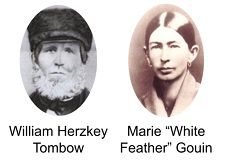| |

|
 |
|

-
| Name |
Jean Cusson |
| Suffix |
Sr. |
| Born |
Claire, Diocese of Rouen, France  |
| Gender |
Male |
| Person ID |
I09908 |
Tombeau Family Tree |
| Last Modified |
24 Feb 2007 |
| Family |
Jacqueline Pepin, b. Claire, Diocese of Rouen, France  |
| Children |
| + | 1. Jean Cusson, Jr., b. 1636, Claire, Diocese of Rouen, France  , d. 8 Apr 1708, St. Sulpice, Canada , d. 8 Apr 1708, St. Sulpice, Canada  (Age 72 years) (Age 72 years) |
|
| Family ID |
F3706 |
Group Sheet | Family Chart |
-
| Notes |
- The following website contains the biography of Jean Cusson: The Dupuis Family: http://ourworld.cs.com/RAYMDUPUIS/CUSSON.HTML
JEAN CUSSON de Rouen, Normandy, France
CUSSON, Jean, agriculturalist (farmer), fiscal magistrate, registrar, royal notary, provisional magistrate of the King, born in Clair, near Rouen (Normandy) in 1632 or about 1635 or 1636, son of Jean Cusson and of Jaqueline Pepin, deceased at Saint Sulpice the 8th of April 1718.
One could say with reason enough that the (early) colonists of New France, artisans or military people more than agriculturists, drawn (to the New World) moreover by the fur treaty, were interested only moderately in agriculture. For many of them, the cultivation of their lands remained a marginal activity and constituted in short only a supplement,necessary but submitted to with impatience, which one got out of at the first opportunity.
There were certainly, real "habitants": John Cusson was among those. Having married in Trois-Rivieres, the 16th of September 1656, to Marie Foubert, a girl 15 years old, originally from Rouen, Cusson established himself at Cap-de-la-Madeleine. As early as 1667, the couple possessed seven horned animals and twenty-eight producing acres, which was really extraordinary.( A French arpent=acre is about 1-1/2 English acres.)
Cusson, certainly, had sufficient resources to hire farm hands such as Francois Vannasse (already there in 1666) and Jean Pilon, 25 and 40 years old respectively, censused (listed as residents) at his home in 1667. However, in spite of the functions which he was going to fill in the justice (judicial) area, Cusson did not neglect the cultivation of his land: in 1681 he declared six horned animals and forty acres.
When, in 1669, the Jesuits, seigneurs (lords)of Cap-de-la-Madeleine, gave Cusson a commission as notary, fiscal magistrate and registrar , the Intendant (see note #1 below),Boutrose d'Aubigny, struggled (sued) justly in Quebec to remove from the West Indies Company the right of nomination of the notaries, and to restrain the powers of the seigneurs (lords)in the field of justice. If he hurried(acquiesced) to receive Cusson in his commission as fiscal magistrate and registrar, the Intendant authorized him however to execute that of notary only temporarily, and on the express condition that he took the title of royal notary. The seigneurs would soon have no more than the right of presentation of the notaries,the nomination being in the province of the Intendant. Cusson performed the functions of notary at Cap-de-la-Madeleine until 1687, then, from 1687 to 1700, in the Seignoury of Champlain. (see note #2 below). In 1700, he went to Montreal where he performed his duties for four years. He resided at Pointe-aux-Trembles. In 1704, at the age of about 70, Cusson went into retirement, from which he came out momentarily in 1707-1708, when he was provisional magistrate of the King at Montreal.
Cusson had twelve children by his wife. A fact rather rare at the time, they all reached adult age.*
Andre Vachon
Source: Dictionnaire Biographique du Canada, Vol. 11, 1701 - 1740
Notes:
1. Intendant: in the 17th and 18th century someone delegated in the name of the king to supervise the various general services.
2. Seignoury: territory over which a lord had authority.
*According to Tanquay's Dictionnaire Genealogique des Familles Canadien, Jean had 16 children, all of whom reached adulthood.
The foregoing is a translation of a biography of Jean Cusson, the first Cusson to emigrate from France to Canada. The original was written in French. The phrasing and grammatical structure is French-Canadian and therefore is difficult to translate into English without destroying the original intent of the writer. That is why it may "sound" strange to our English ears. The remarks in parentheses ( ) were added by me to provide some help to the reader.
Raymond L. Dupuis
|
|
|
|